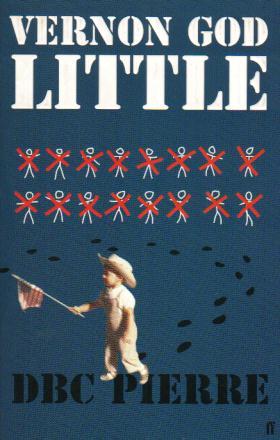
DBC Pierre
The following novels constitute the shortlist for the 2003 Booker Prize:
2003 Longlist
Notable Omissions from the 2003 Long/Shortlist

|
Vernon God Little DBC Pierre |
Dustjacket synopsis:
"A twenty-first century comedy in the presence of death.
"Fifteen-year-old Vernon Gregory Little is in trouble. And it has something to do with the recent massacre of sixteen students at his high school. News of the tragedy serves as open invitation to the media and soon the quirky backwater of Martirio is flooded with wannabe CNN hacks all-too-keen to lay claim to their fifteen minutes, and lay the blame for the killings at Vernon's feet. Eulalio Ledesma, in particular, sniffs out the opportunity to make good at Vernon's expense and as the media net tightens, Vernon finds himself drawn into a series of increasingly bizzare circumstances. Eventually, with the LSD safely diluted in the ginseng, and essential travel funds procured from a distasteful trade-off with old Mr Deutschman, he succumbs to the workings of Fate and takes off for Mexico and a date - or so he hopes - with the divine Taylor Figueroa.
"Vernon God Little is the only novel quite unlike any other and quite possibly the only novel to be set in the barbecue-sauce capital of Central Texas. Its depiction of innocence and simple humanity in an evil world is never less than astonishing. Peopled by a cast of grotesques, freaks, cold-blooded chattering housewives (who are all, mysteriously, recently widowed), and one very special adolescent with an unfortunate talent for being in the wrong place at the right time, Vernon God Little is a riotous adventure story which cuts a satirical swathe through the heart of contemporary America."
Quotes:
"Read Vernon God Little not only for its dangerous relevance, but for the coruscating wit and raw vitality of its
voice, which recalls maybe Flannery O'Connor on an overdose of amphetamines and cable television" - Jonathan Lethem
First Paragraph:
It's hot as hell in Martirio, but the papers on the porch are icy with the news. Don't even try to guess who stood all Tuesday night in the road. Clue: snotty ole Mrs Lechuga. Hard to tell if she quivered, or if moths and porchlight through the willows ruffled her skin like funeral satin in a gale. Either way, dawn showed a puddle between her feet. It tells you normal times just ran howling from town. Probably forever. God knows I tried my best to learn the ways of this world, even had inklings we could be glorious; but after all that's happened, the inkles ain't easy anymore. I mean - what kind of fucken life is this?
Now it's Friday at the sheriff's office. Feels like a Friday at school or something. School - don't even fucken mention it.
I sit waiting between shafts of light from a row of doorways, naked except for my shoes and Thursday's underwear. Looks like I'm the first one they rounded up so far. I ain't in trouble, don't get me worng. I didn't have anything to do with Tuesday. Still, you wouldn't want to be here today. You's remember Clarence Somebody, some ole black guy who was on the news last winter. He was the psycho who dozed in this same wooden hall, right on camera. The news said that's how little he cared about the effects of his crimes. By 'effects' I think they meant axe-wounds. Ole Clarence Whoever was shaved clean like an animal, and dressed in the kind of hospital suit that psychos get, with jelly-jar glasses and all, the type of glasses worn by people with mostly gums and no teeth. They built him a zoo cage in court. Then they sentenced him to death.
From the faber and faber paperback edition, 2003.

|
Brick Lane Monica Ali |
Dustjacket synopsis:
"Nazneen's inauspicious entry to the world, an apparent stillbirth on the hard mud floor of a Bangladeshi village hut,
imbues in her a sense of fatalism that she carries across continents when she is married off to Chanu. Her life in
London's Tower Hamlets is, on the surface, calm. For years, keeping house and rearing children, she does what is expected
of her. Yet Nazneen walks a tightrope stretched between her daughters' embarrassment and her husband's resentments.
Chanu calls his elder daughter the little memsahib. 'I didn't ask to be born here,' says Shahana, with regular finality.
"Into that fragile peace walks Karim. He sets questions before her, of longing and belonging; he sparks in her a turmoil that reflects the commnity's own; he opens her eyes and directs her gaze - but what she sees, in the end, comes as a surprise to them both.
"While Nazneen journeys along her path of self-relaization, a way haunted by her mother's ghost, her sister Hasina, back in Bangladesh, rushes headlong at her life, first making a 'love marriage', then fleeing her violent husband. Woven through the novel, Hasina's letters from Dhaka recount a world of overwhelming adversity. Shaped - yet ultimately not bound - by their landscapes and memories, both sisters struggle to dream themselves out of the rules prescribed for them.
"Beautifully rendered and, by turns, both comic and deeply moving, Brick Lane establishes Monica Ali as one of the most exciting new voices in fiction."
Quotes:
"A very special novel - I adored it. It gave me everything I crave...entertaining, moving and fascinating" - Margaret
Forster.
First Paragraph:
Mymensingh District, East Pakistan, 1967
An hour and forty-five minutes before Nazneen's life began - began as it would proceed for quite some time, that is to say uncertainly - her mother Rupban felt an iron fist squeeze her belly. Rupban squatted on a low three-legged stool outside the kitchen hut. She was plucking a chicken because Hamid's cousins had arrived from Jessore and there would be a feast. 'Cheepy-cheepy, you are old and stringy,' she said, calling the bird by name as she always did, 'but I would like to eat you, indigestion or no indigestion. And tomorrow I will have boiled rice, no parathas.'
She pulled some more feathers and watched them float around her toes. 'Aah,' she said. 'Aaaah. Aaaah.' Things occurred to her. For seven months she had been ripening, like a mango on a tree. Only seven months. She put those things that had occurred to her aside. For a while, an hour and a half, though she did not know it, until the men came in from the fields trailing dust and slapping their stomachs, Rupban clutched Cheepy-cheepy's limp and bony neck and said only coming, coming to all enquiries about the bird. The shadow of the children playing marbles and thumping each other grew long and spiky. The scent of fried cumin and cardamom drifted over the compound. The goats bleated high and thin. Rupban screamed white heat, red blood.
From the Doubleday paperback edition, 2003.
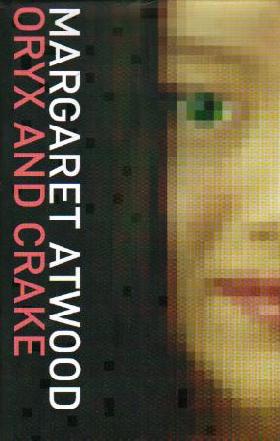
|
Oryx and Crake Margaret Atwood |
Dustjacket synopsis:
"Margaret Atwood's classic novel The Handmaid's Tale, is about the future. Now in Oryx and Crake, the future
has changed. It's worse.
"The narrator of Atwood's riveting novel calls himself Snowman. When the story opens he's sleeping in a tree, wearing an old bedsheet, mourning the loss of his beloved Oryx and his best friend Crake, and slowly starving to death. He searches for supplies in a wasteland where insects proliferate and pigoons and wolvogs ravage the Pleeblands where ordinary people once lived, and in the Compounds that sheltered the extraordinary. As he tries to piece together what has taken place, the narrative shifts to decades earlier. How did everything fall apart so quickly? Why is he left with nothing but his haunting memories? Alone except for the green-eyed Children of Crake, who think of him as a kind of monster, he explores the answers to these questons in the double journey he takes - into his own past, and back to Crake's high-tech bubble dome, where the Paradice Project unfolded and the world came to grief.
"With breathtaking command of her shocking material and with her customary sharp wit and dark humour, Atwood projects us into a less-than-brave new world, an outlandish yet wholly believable space populated by a cast of characters who will continue to inhabit your dreams long afterthe last chapter. This is Magaret Atwood at the absolute peak of her powers."
First Paragraph:
Snowman wakes before dawn. He lie sunmoving, listening to the tide coming in, wave after wave sloshing over the various barricades, wish-wash, wish-wash, the rhythm of heartbeat. He would so like to believe he is still asleep.
On the eastern horizon there's a grayish haze, lit now with a rosy, deadly glow. Strange how that colour still seems tender. The offshore towers stand out in dark silhouette against it, rising improbably out of the pink and pale blue of the lagoon. The shrieks of the birds that nest out there and the distant ocean grinding against the ersatz reefs of rusted car parts and jumbled bricks and assorted rubble sound almost like holiday traffic.
Out of habit he looks at his watch - stainless-steel case, burnished aluminium band, still shiny although it no longer works. He wears it now as his only talisman. A blank face is what it shows him: zero hour. It causes a jolt of terror to run through him, this absence of official time. Nobody nowhere knows what time it is.
From the Bloomsbury hardback edition, 2003.
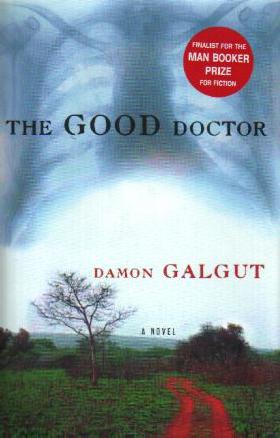
|
The Good Doctor Damon Galgot |
Dustjacket synopsis:
"A taut, eerie, and intense tale of the dashed hopes of postapartheid South Africa and the small betrayals that doom a
friendship, The Good Doctor is an extraordinary parable of the corruption of the flesh and spirit. Chosen for the
shortlist for the Man Booker Prize, and winning enthusiastic early acclaim all over the world, The Good Doctor will
assure Damon Galgut's place as a major international talent.
"When Laurence Waters arrives at his new post at a deserted rural hospital, staffphysician Frank Eloff is instantly suspicious. Laurence is young, optimistic, and full of big ideas - everything Frank, hardened and embittered by years of irrelevancy and disappointment in the "bush," is not. Frank watches with a mixture of bemusement and irritation as Laurence sets about trying to bring the hospital and its diffident staff back to life.
"The whole town is beset with new arrivals and the return of old faces. Frank reestablishes a secret romantic liaison with a local woman, one that will have unexpected consequences for him, for her, and even for Laurence. The Brigadier, an African who shaped himself into a local dictator during apartheid days, is rumored to be back in town, and active in cross-border smuggling. A group of soldiers has moved in to track him, and to close the borders, led by a man from Frank's own dark past. Laurence sees only possibilities - but in a world where the past is demanding restitution from the present, his ill-starred idealism cannot last. When the final denouement comes, who will make the cynical choice, and who the moral one?
"The Good Doctor is a sparkling, highly accomplished piece of fiction that casts an unsparing eye on the "new" South Africa and on the deceptions and self-deceptions that crawl under the surface of the human struggle to do what is right."
Quotes:
"A truly remarkable novel, steeped in contemporary history, yet at the same time transcending it. I was enthralled by
its intensity and the immediacy of every small twist and turn of the story." - André Brink.
"At a time when much of so-called 'literary' fiction has settled into fulfilling comfortable expectations, The Good
Doctor unsettles and confounds. There are traces of J.M. Coetzee and Graham Greene, but Damon Galgut is a true
original." - Geoff Dyer
"If there is a posterity, The Good Doctor will be seen as one of the great literary triumphs of South Africa's
transition, a novel that is in every way the equal of J.M. Coetzee's Disgrace...[Galgut is] a novelist of great
and growing power." - Rian Malan
[The Good Doctor] vibrates with an eerie sense of foreboding....A gripping read, laced throughout with
powerful emotional truth and Damon Galgut's extraordinary vision." - The Independent
"One of South Africa's best novelists... In The Good Doctor Galgut's prose is beautifully understated, and it often
reaches a level of thillerish tension." The Guardian
"Galgut handles the crackling tension between races with subtlety and sympathy....The 'hot, dense country' is made
palpable, and density is moral as well as topographical....Galgut's book is sensory and reflective in equal and impressive
measure." - Sunday Times
First Paragraph:
The first time I saw him I thought, he won't last.
I was sitting in the office in the late afternoon and he appeared suddenly in the doorway, carrying a suitcase in one hand and wearing plain clothes - jeans and a brown shirt - with his white coat on top. He looked young and lost and a bit bewildered, but that wasn't why I thought what I did. It was because of something else, something I could see in his face.
He said, 'Hello...? Is this the hospital?'
His voice was unexpectedly deep for somebody so tall and thin.
'Come in,' I said. 'Put down your bag.'
He came in, but he didn't put down the bag. He held it close while he looked around at the pink walls, the empty chairs, the dusty desk in the corner, the frail plants wilting in their pots. I could see that he thought there'd been some kind of mistake. I felt sorry for him.
From the Grove Press hardback edition, 2003.
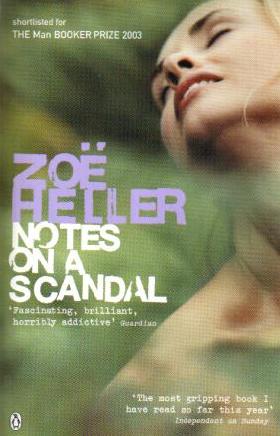
|
Notes on a Scandal Zoe Heller |
Dustjacket synopsis:
"From the first day that the beguiling Sheba Hart joins the staff of St George's, history teacher Barbara Covett is
convinced that she has found a kindred spirit. Barbara's loyalty to her new friend is passionate and unstinting and
when Sheba is discovered having an illicit affair with one of her young pupils, Barbara quickly elects herself as Sheba's
chief defender. But all is not as it first seems in this dark story and, as Sheba will soon discover, a friend can be
just as treacherous as a lover."
Quotes:
"The most gripping book I have read so far this year" - Independent on Sunday
"Superbly gripping. One of the most compelling books I've read in ages." - Daily Telegraph
"Deliciously sinister" - Daily Mail
"Excellent. An undercurrent of subtle malice, cleverly controlled by Heller" - Evening Standard
"Reads like a nose thorugh someone else's bathroom cabinet: full of guilty insights and delicious snobbery" -
Independent
"A subtle study in obsession and loneliness ... my take-it-to-the-beach recommendation" - Monica Ali, Guardian
Summer Reading
First Paragraph:
1 March 1998
The other night at dinner, Sheba talked about the first time that she and the Connoly boy kissed. I had heard most of it
before, of course, there being few aspects of the Connolly business that Sheba has not described to me several times
over. But this time round, something new came up. I happened to ask her if anything about the first embrace had
surprised her. She laughed. Yes, the smell of the whole thing had been surprising, she said. She hadn't
anticipated his personal odour and if she had, she would probably have guessed at soemting teenagey: bubble gum, cola,
feet.
When the moment arrived, what I actually inhaled was soap, tumble-dried laundry. He smelled of scrupulous self-maintenance. You know the washing-machine fug that envelops you sometimes, walking past the basement vents of mansion flats? Like that. So clean, Barbara. Never any of that cheese and onion breath that the other kids have...
From the Penguin Books paperback edition, 2003.
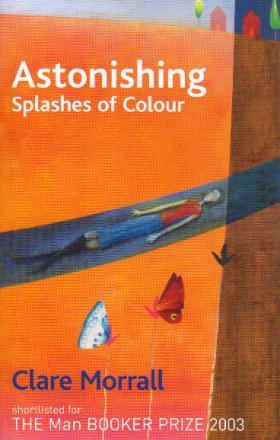
|
Astonishing Splashes of Colour Clare Morrall |
Quotes:
"An extremely good first novel: deceptively simple, subtly observed, with a plot that drags you forward like a strong
current" - Daily Mail
"Kitty Wellington, the narrator of Clare Morrall's absorbing and sure-footed first novel, has been brought up in a large
family by her painter father. Surrounded by older brothers, she has no real recollection of either her mother, who was
killed in a car crash, or her sister, who ran away from home....The great strength of the novel is Kitty herself. Morrall
has provided her with a compelling narrative voice - wry, confiding, perceptive. Echoes from JM Barrie's disturbing
masterpiece are quietly sounded, with particular emphasis on missing mothers and 'lost boys'....Astonishing Splashes of
Colour is not a showy book, but it is extremely well written and compulsively readable. At her very first attempt,
Morrall has written a genuinely solid and satisfying work of fiction, skilfully plotted and fielding a cast of fully
realised and individualised characters. More, please." - Sunday Times
"Fresh, frightening and raw. There's nothing in the least depressing about his nevertheless sad story, certainly
nothing remotely sentimental" - Margaret Foster
"A moving novel about loss, and particularly lost children" - Guardian
"Heartbreaking and accomplished" - Bookseller
First Paragraph:
At 3.15 every weekday afternoon, I become anonymous in a crowd of parents and child-minders congregating outside the school gates. To me, waiting for children to come out of school is a quintessential act of motherhood. I see the mums - and the occasional dads - as yellow people. Yellow as the sun, a daffodil, the submarine. But why do we teach children to paint the sun yellow? It's a deception. The sun is white-hot, briiliant, impossible to see with the naked eye, so why do we confuse brightness with yellow?
The people outside the school gates are yellow because of their optimisim. There's a picture in my mind of morning in a kitchen, the sun shining past yellow gingham curtains on to a wooden table, where the children sit and eat breakfast. Their arms are firm and round, their hair still tangled from sleep. They eat Coco Pops, drink milk and ask for chocolate biscuits in their lunchboxes. It's the morning of their lives, and their mums are reliving that morning with them.
From the Tindall Street Press paperback edition, 2003.
Yellow Dog, Martin Amis
Turn Again Home, Carol Birch
Crossing the Lines, Melvyn Bragg
Elizabeth Costello, J. M. Coetzee
The Taxi Driver's Daughter, Julia Darling
Schopenhauer's Telescope, Gerard Donovan
The Romantic, Barbara Gowdy
The Curious Incident of the Dog in the Night-Time, Mark Haddon
The Nick of Time, Francis King
Heligoland, Shena Mackay
Jazz, etc, John Murray
Something Might Happen, Julie Myerson
Judge Savage, Tim Parks
A Distant Shore, Caryl Phillips
Waxwings, Jonathan Raban
The Light of Day, Graham Swift
Frankie & Stankie, Barbara Trapido
This page and its contents are copyright © 2005-06 by Perry Middlemiss, Melbourne, Victoria, Australia.
Last modified: January 1, 2006.